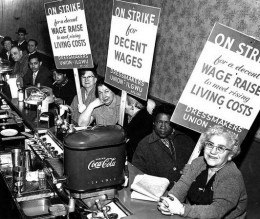On “Militancy” and Fast Food Strikes

Many of us never thought we’d be stuck in low-wage work. Growing up, I was told that if I went to college and got a degree, I’d have a better standard of living than I’d grown up with. I went to college on a scholarship, paying my living expenses by working on farms across Western North Carolina. I graduated as the recession hit, without prospects for a living wage job or industry connections.
After scouring the region for work, I landed a job as a veterinary technician. Despite being a so-called “skilled” job, I only received 25 hours a week and $8.50 an hour. I was laid off less than six months later. For nearly a year, the only work I could find was as a temp landscaper, working for $10 an hour with no guaranteed hours, no provided safety equipment, and regular wage theft.
I applied to every retail and fast food company in the area; to the post office and UPS, where I didn’t even get called back for holiday temp work. I was desperate — and not alone. When Whole Foods opened its new store in Greensboro, NC, it hired for 100 open positions. More than 3,000 people submitted applications — a number the regional management kept bringing up during employee orientation. The clear message: we should consider ourselves lucky to have jobs.
In Jacobin, Trish Kahle writes about the low-wage strike movement, about how her own experience with striking got her better pay, and why the Left should move beyond their conceptualizing labor unions like the SEIU as “monoliths incapable of change.”
Photo: Keel Center
Support The Billfold
The Billfold continues to exist thanks to support from our readers. Help us continue to do our work by making a monthly pledge on Patreon or a one-time-only contribution through PayPal.
Comments